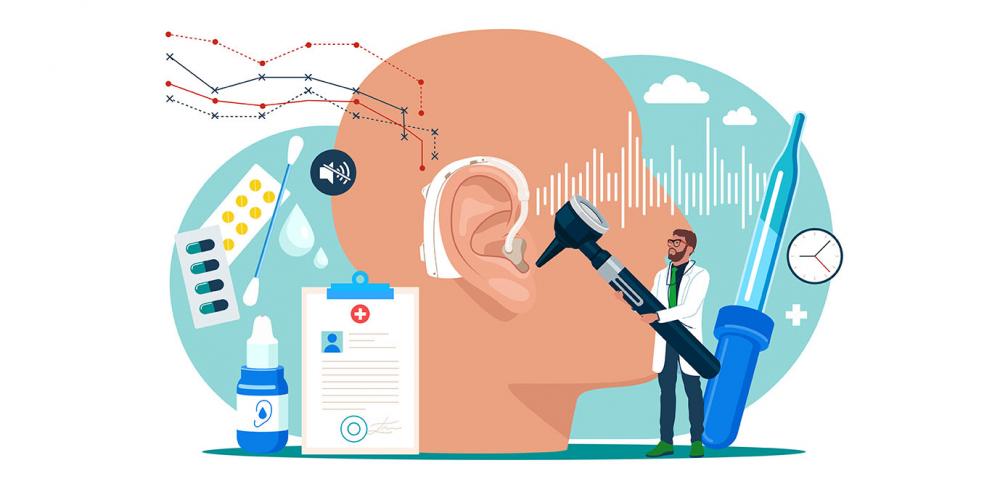
Loss of Hearing and Omega-3's
The loss of hearing due to ageing is a common disorder which affects large numbers of the population around the world. As we age, many people experience hearing loss which can, in some cases, also lead to tinnitus.
Several studies over the last decade report conclusively that increasing the consumption of Omega-3 fatty acids, found in fish and fish oil supplements, help reduce hearing loss in an ageing population.
Omega-3 fatty acids are known to be important for the health of the body as part of a balanced diet. The body cannot manufacture these, and so dietary intake is essential for hormone health, heart health, and numerous other benefits.
Studies on hearing loss and omega 3 intake
A study in Australia, called The Blue Mountains Hearing Study, was a population-based survey which was carried out for five years.1 Approximately 3000 participants filled out questionnaires from which their Omega-3 intakes were calculated. The participants had a hearing test at the start of the survey and then five years later.
The results showed a relationship between hearing loss and Omega-3 intake. The participants who ate oily fish twice a week or more had a 42% lower risk of hearing loss compared to those who ate fish once a week.
Another study conducted in the Netherlands2 measured Omega-3 levels in the blood and hearing thresholds. The study involved 720 men and women over three years. The results showed that those with lower Omega-3 levels experienced the greatest hearing loss and additionally most of the hearing loss occurred at lower frequencies. Examples of lower frequencies include bass sounds in music.
It is theorised that Omega-3s support the health of the inner ear cells by reducing inflammation from all sources whether due to an inflammatory diet, loud noises, infections, or chemicals.
So how much Omega-3 do we need?
There is not one simple answer as to how much Omega-3 we need daily. The World Health Organisation (WHO) suggest that healthy adults should have a combined EPA and DHA of 250mg–500mg daily.3
Whilst the bare minimum is 250mg to 500mg daily, the consensus amongst scientists is that in order to obtain Omega-3’s benefits, we need a lot more, especially if we are looking at protecting numerous body systems such as the heart, joints and other structures.
The European Food Safety Authority (EFSA) for example recommends a combined EPA and DHA of 3000mg for normal blood pressure.3 This is clearly a far cry from 250mg to 500mg daily recommendation by the World Health Organisation.
Since fish oils do provide multiple benefits to the body, I would suggest that the intake of Omega-3 fish oils should be somewhere in between the two recommendations.
Bare Biology’s Life and Soul Omega-3 Daily Fish Oil capsules provide 1460 of Omega-3 in two capsules which equates to 730mg per capsule which is a very good strength. Additionally, these Omega-3 fish oil provide fatty acids are derived from small fish such as sardines and anchovies which means that they are less likely to contain toxins such as heavy metals and other toxins common to some fish liver oils.
Omega-3 supplements and their benefits for maintaining overall health and for protection against age-related concerns, including hearing loss, are well documented. It now seems that almost everyone should take a daily fish oil supplement especially those with hearing loss or those who are at risk from loss of hearing.
References:
- Gopinath B, Flood VM, Rochtchina E, McMahon CM, Mitchell P. Consumption of omega-3 fatty acids and fish and risk of age-related hearing loss. Am J Clin Nutr. 2010 Aug;92(2):416-21.
- Dullemeijer C, Verhoef P, Brouwer IA, Kok FJ, Brummer RJ, Durga J. Plasma very long-chain n-3 polyunsaturated fatty acids and age-related hearing loss in older adults. J Nutr Health Aging. 2010 May;14(5):347-51.
- How much omega-3 fish oil do you need per day? by Bare Biology
DISCLAIMER: The views, opinions and information expressed in this article and on Victoriahealth.com Ltd are those of the author(s) in an editorial context. Victoriahealth.com Ltd cannot be held responsible for any errors or for any consequences arising from the use of the information contained in this editorial or anywhere else on the site. Every effort is made by the editorial and content team to see that no inaccurate or misleading information, opinion or statement appear, nor replace or constitute endorsement from medical bodies or trials unless specified. Victoriahealth.com Ltd accept no liability for the consequences of any inaccurate or misleading data, information, opinion or statement. Information on Victoriahealth.com Ltd and in the editorials is provided for informational purposes only and is not intended as a substitute for the advice provided by your physician or other healthcare professional. You should not use the information on this website or in the editorials for diagnosing or treating a health concern or disease, or for the replacement of prescription medication or other treatment.